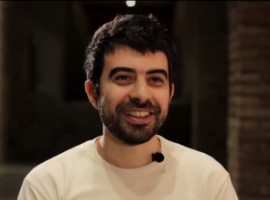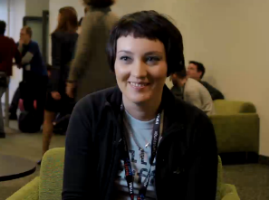InfoQ Homepage Performance Content on InfoQ
-
Yao Yue on Making Twitter's Pelikan Cache Fast And Reliable
Yao Yue explains the motivation for building Twitter's Pelikan cache, how Pelikan differs from other caches, what to do and what to avoid when building reliably low latency software, and much more.

-
Interview with Martin Thompson on High Performance Java
Alex Blewitt speaks to Martin Thompson at QCon London 2016 on his open-source high-performance networking stack Aeron, and how it avoids garbage collection delays for consistently low latency. Martin explains the use of the xadd processor instruction to avoid spinning wait loops and looks ahead to where CPU technology is heading in the future.

-
David Riddoch on Bypassing the Kernel and Hypervisor for Network I/O, Solarflare, OpenOnload
David Riddoch explains how bypassing the OS kernel's networking stack can improve latency and throughput, networking with Solarflare and OpenOnload, hypervisor bypass, and much more.

-
John Sheehan on Web API Quality
In this interview, John Sheehan expounds on what constitutes a high quality API. The first half focuses on developer experience which will help API consumers distinguish between top tier API providers and the rest. The second half provides pointers for API providers aiming to improve various aspects of API quality, specifically performance across the API lifecycle.

-
Gil Tene on Understanding Latency
Gil Tene explains latency and how it relates to service and response times, measuring latency, common misconceptions about latency, what to do when a system's latency can't meet SLAs, and much more.

-
Monica Beckwith on Tuning and Optimizing Java Garbage Collection
Performance engineer Monica Beckwith covers tuning java garbage collection, including: defining customer requirements; methodology; baselining and measurement; strengths and weaknesses of the different collectors; heap usage; causes of GC pauses; the distribution of pauses; tuning pause characteristics; going off-heap to avoid collection; scaling GC on multi-core and high memory machines.

-
Bryan Cantrill on Containers, Linux, Triton and Illumos, Virtualization, Node.js
Bryan Cantrill explains Triton (a way to run secure Linux containers on bare metal), the history of DTrace and ZFS and their (lack of) adoption on Linux, the relevance of OS R&D, Unikernels and more.

-
Sadek Drobi on Architecture, Scala
Sadek Drobi explains ways to simplify software architectures by reframing the problem and requirements. Also: Scala, Prismic.io, and much more.

-
Caitie McCaffrey on Scaling Halo 4 Services, the Orleans Actor Framework, Distributed Programming
Caitie McCaffrey talks about scaling game backend services for Halo 4 and others, stress & performance testing, the Orleans actor framework, and the future of distributed programming.

-
Jessica Frazelle on Working at Docker
Jessica Frazelle tells InfoQ what it's like to work at Docker open source, what are some of the goals for Docker Inc in the near future and the rational between Docker's clustering solution (Swarm).

-
Natalia Chechina on Scaling Distributed Erlang with SD Erlang
Natalia Chechina explains the challenges of scaling distributed Erlang beyond a certain number of systems and how SD Erlang helps to overcome those problems.

-
Peter Bourgon on CRDTs, Go at SoundCloud
Peter Bourgon discusses distributed programming with commutative replicated data types (CRDTs), how they work, what problems they solve, and his experience with using the Go language at SoundCloud.
